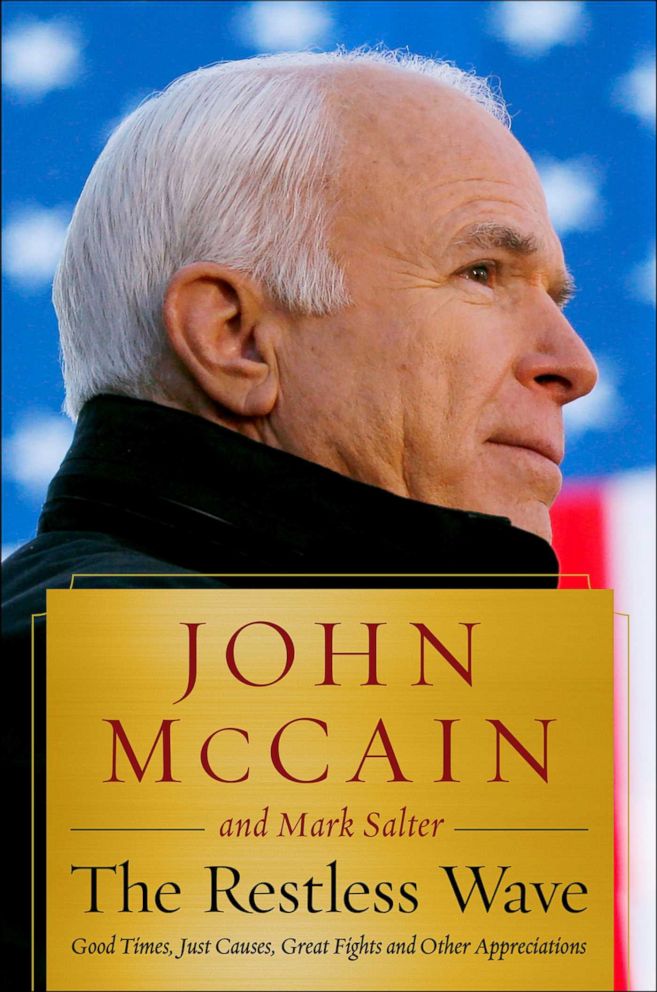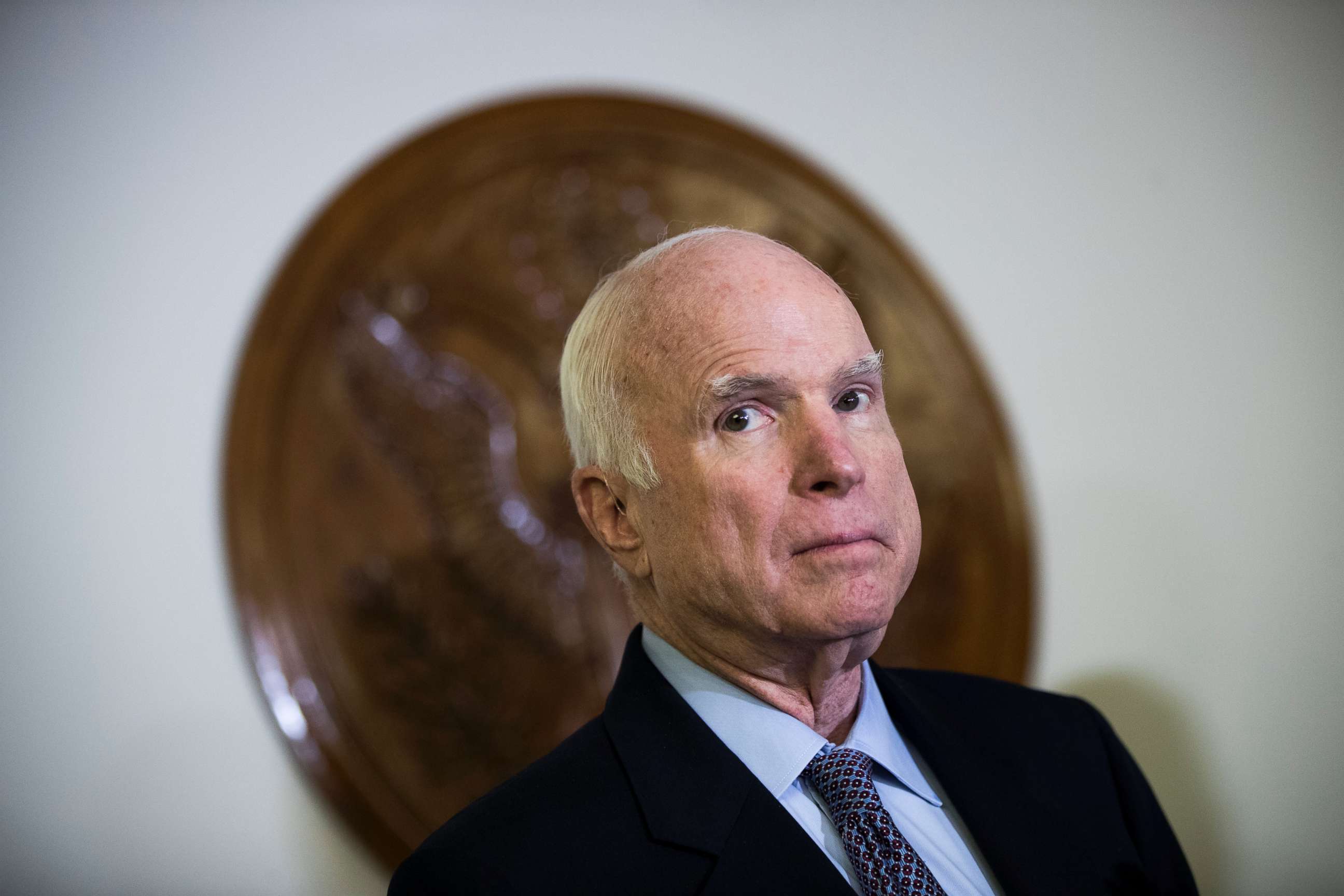Key takeaways from John McCain's new book 'The Restless Wave'
McCain says he's freer to speak his mind without much consequence.
Sen. John McCain is nothing if not outspoken.
And the Arizona Republican is true to his reputation in his new book, "The Restless Wave: Good times, Just Causes, Great Fights, and Other Appreciations," in which he provides insights into his historic 2008 presidential race against Barack Obama, his thoughts on Donald Trump's presidency, and his hopes for a return to "regular order" in American politics.
Here are some key takeaways:
McCain suggests his garbled questioning of Comey was related to his brain tumor
In June 2017, former FBI Director James Comey was testifying before the Senate Intelligence Committee.
McCain had just returned from a multi-nation overseas congressional delegation trip just days before Comey was to testify. As an ex-officio member of the committee, McCain was given the courtesy of asking Comey questions at the end of the hearing.
“Something was off. I didn't know exactly what. Fatigue mainly. I felt unusually tired," McCain writes in his memoir, rehashing the days leading up to the hearing.
At one point during the hearing, McCain made a reference to "President Comey." McCain's bizarre performance confused not only viewers but seemingly Comey himself.
"Something happened between reading the question and asking it," McCain writes. "To this day, I'm really not sure what caused it. But as was widely noted at the time, I was incomprehensible. It was a high-profile hearing, carried live by the cable news networks. My strange performance was the focus of commentary on cable and fuel for Twitter. I felt embarrassed for myself and sorry for confusing Comey. It was one of the more mortifying experiences of my public career. Even now, I wince at the memory of it."
At the time, McCain's staff said he had stayed up late watching an Arizona Diamondbacks game.
But in his memoir, McCain suggests his garbled questioning was related to the glioblastoma, which was undiagnosed at the time.
McCain said he tried to "put the whole thing down to a bad bout of jet lag," but "a small concern nagged at me."
Just a few weeks later, a regular physical at Mayo Clinic in Scottsdale revealed the need for immediate cranial surgery, which led to his brain-cancer diagnoses.
Steele dossier critics "can go to hell"
McCain acknowledged in January 2017 that he delivered a dossier of "sensitive information" to then-FBI Director Comey.
McCain writes that he "did what duty demanded I do" in passing on the documents.
"I discharged that obligation, and I would do it again. Anyone who doesn't like it can go to hell," McCain said.
"I agreed to receive a copy of what is now referred to as 'the dossier.' I reviewed its contents. The allegations were disturbing, but I had no idea which if any were true. I could not independently verify any of it, and so I did what any American who cares about our nation's security should have done," he writes.
McCain recounts how he put the dossier in a safe in his office and called Comey's office to request a meeting: "I went to see him at his earliest convenience, handed him the dossier, explained how it had come into my possession."
"I said I didn't know what to make of it, and I trusted the FBI would examine it carefully and investigate its claims. With that, I thanked the director and left. The entire meeting had probably not lasted longer than ten minutes. I did what duty demanded I do," McCain concludes.
McCain regrets not tapping Joe Lieberman as his VP candidate
During the 2008 presidential campaign, McCain was set on picking his friend, Joe Lieberman, the Democratic-turned-Independent senator from Connecticut, as his running mate.
He was eventually talked out of the idea by campaign advisers.
"The reality of Republican politics set in. Even were Joe to give assurances that he would be duty bound to uphold my positions on all issues were he to assume the presidency, it wouldn't stop the intraparty brawl that would be the only story coming out of the Republican convention, and would dominate coverage of our campaign in the critical first weeks of the fall campaign," McCain writes.
"They were giving me their best counsel. It was sound advice that I could reason for myself," McCain writes. "But my gut told me to ignore it, and I wished I had. America's security and standing in the world were my principal concerns and the main reason, other than personal ambition, that I ran for President. Joe and I share those priorities, and on most related issues we agree on how best to serve them. I completely trusted, liked, and worked well with Joe."

After his advisers convinced him to nix the idea of tapping Lieberman, McCain writes, "I sulked about it for a little while."
When his advisers raised the possibility of running with Sarah Palin, McCain writes, "I was intrigued."
Despite Palin’s widely-panned performance on the campaign trail, McCain defends her.
"She stumbled in some interviews, and had a few misjudgments in the glare of the ceaseless spotlight and unblinking cameras," McCain writes. "Those missteps, too, are on me. She didn't put herself on the ticket. I did. I asked her to go through an experience that was wearing me down, that wears every candidate down. I made mistakes and misjudgments, too."
This will be McCain’s final term
"This is my last term," he writes.

"If I hadn’t admitted that to myself before this summer, a stage 4 cancer diagnosis acts as ungentle persuasion," McCain continues.
The senator was re-elected in 2016. Senators serve six-year terms.
McCain has spent the last several months in his home state of Arizona recuperating from the side effects of brain-cancer treatment. He was admitted to the hospital in April after undergoing surgery to treat an intestinal infection related to diverticulitis. His office confirmed he is now in stable condition and resting at home.
"I don't know how much longer I'll be here. Maybe I'll have another five years. Maybe with the advances in oncology, they'll find new treatments for my cancer that will extend my life," he writes.
"Maybe I'll be gone before you hear this," he added. "I’m freer than colleagues who will face the voters again. I can speak my mind without fearing the consequences much. And I can vote my conscience without worry. I don't think I'm free to disregard my constituents' wishes, far from it. I don't feel excused from keeping pledges I made. Nor do I wish to harm my party's prospects. But I do feel a pressing responsibility to give Americans my best judgment."
Obama called McCain to thank him for his "thumbs down" vote on health care
McCain details how he received a phone call from Obama following his now-famous "thumbs down" vote on Senate Republicans' attempt to repeal Obama's signature health care law last July.
"Among the people who called to thank me was President Obama," McCain writes.
"I appreciated his call, but, as I said, my purpose hadn't been to preserve his signature accomplishment but to insist on a better alternative, and to give the Senate an opportunity to work together to find one," he writes.
"He hadn't called to lobby me before the vote, which I had appreciated. He had last called me not long after the November election, during the transition to the Trump administration, to congratulate me on my re-election. He added that he was counting on me to be an outspoken and independent voice for the causes I believed in as I had been during his presidency. I thanked him, and said I would try to be."
McCain takes sharp jabs at Trump
In his memoir, McCain has blistering criticisms of Donald Trump's presidency, from his lack of empathy for immigrants and refugees to his praise for "some of the world's worst tyrants."
"I'm not sure what to make of President Trump's convictions," McCain writes. "His lack of empathy for refugees, innocent, persecuted, desperate men, women, and children, is disturbing. The way he speaks about them is appalling, as if welfare or terrorism were the only purposes they could have in coming to our country.
"He has declined to distinguish the actions of our government from the crimes of despotic ones. The appearance of toughness, or a reality show facsimile of toughness, seems to matter more than any of our values. The world expects us to be concerned with the condition of humanity. We should be proud of that reputation. I’m not sure the president understands that."
But McCain writes that "before I leave I'd like to see our politics begin to return to the purposes and practices that distinguish our history from the history of other nations.
"I would like to see us recover our sense that we are more alike than different."




